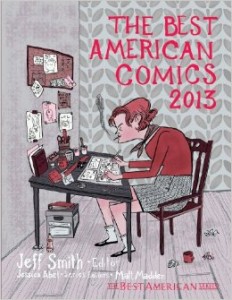 The Best American Comics 2013
The Best American Comics 2013
Edited by Jeff Smith
Series Edited by Jessical Abel & Matt Madden
Houghton Mifflin Harcourt, Oct 2013
400 pages / $25 Buy from Amazon or Houghton Mifflin Harcourt
The Best American Comics series is an anthology of comics, published annually with numerous guest editors, showcase what the editors feel are the best comics of the year. This edition contains thirty comics; some of them being complete, and others excerpts from larger comics. What is also nice to see is the vast majority of webcomics that are included in this edition, such as Kate Beaton’s tumblr famous ‘Hark A Vagrant!’ series. And although different, these comics all seem to share something in common, something ethereal that seems to connect these pieces all together that I can’t quite put my finger on, and I am glad that I have trouble doing this.
One of the things that I think brings the comics together is the feelings of anxiety that the characters seem to have. As I was reading the collection, I couldn’t help but think that they all seemed to be looking for something; in Alison Bechdel’s Mirror, the protagonist is searching for not just her own identity, but also seems to be searching not just for her mothers approval and love, but for her mothers identity, as well as trying to find her own place in the world. I think that the search for purpose and identity, although not just central now, as It has been a common problem for centuries, speaks to a generation raised in the internet age, one that has tried to find a personal identity through the lives of millions online.

In You Lied To Us!, by Jorge Aquirre and Rafael Rosado, the protagonist, a little girl, lies to her friends in order to look for, and slay, a local giant. Here, the protagonist is trying to create her identity through tackling the giant on her own, but in confidence is scared and alone. I think that this narrative, the David and Goliath story, echoes throughout a lot of us in our modern day lives; we want to tackle giants on our own, but we are too afraid and lack the skills to do it, and asking for help can make one appear weak. Although, like the previous comic, this is not a new narrative, I do feel that this story seems to hit at the centre of our shared anxieties. We live in a world of self made millionaires, twenty somethings who changed the world, who appeared to do it on their own, indadvertedly causing an entire generation to feel like they have to go it alone as well

Faith Erin Hicks Raiders also talks about individualism, but does so in a different way. The protagonist retrieves what appears to be an artifact of some kind, to return to a ghost seeking some sort of atonement. She does this with the help of her friends at first, but decides to sneak of an seek out the ghost alone, thinking that her friends will think less of her. It appears, despite not finding atonement through the ghost, that her friends also see the ghost, which gives to her a different kind of atonement, causing the ghost to leave. I feel that this seeks to tell us that going it alone is intact damaging, showing one that we all have hidden doubts and fears, here symbolized by the ghost, and sharing these fears and doubts is healthy, and one can overcome the giant, or the ghost, by reaching out to those around you.

What is also interesting to note is how different each piece is from another aesthetically. Each comic in this anthology is distinctly unique in its artwork, ranging from the almost life like, which can be seen in Mirror, to the surreal and weird. Some comics are full of texts, others nothing but a series of images. What is fascinating to note is that they are all able to tell a story, regardless of the way they do so, full of as much power, emotion, and expertise as one would find in a more ‘traditional‘ piece of fiction, such as a novel.
In editing the anthology, the editors seem to be aware of the problems the artists are trinyg to tackle, subconsciously or actively, and are seeking to address these problems through the anthology. What is clever about the addition of the webcomics is that a lot of these problems, of identity and feeling isolated, are ironically magnified by our existence in an online world, but can also be cured by our participation in the same world. One can construct our identities through others; our mothers, stories of great people, our friends, but we aren’t really able to overcome these anxieties and self doubt until we try to identify with ourselves, by confronting our doubts, opening up to our community, and just being ourselves. I feel that this is one of the central messages of this anthology; a reflection on the way we interact and inhabit the world has so drastically changed that we haven’t had the time to catch up to it yet.
***
Rhys Nixon is a writer who lives in Australia. He has been published in electric cereal, Gesture magazine, and posts occasionally on his blog, rhysrhys.tumblr.com.
Tags: Rhys Nixon
